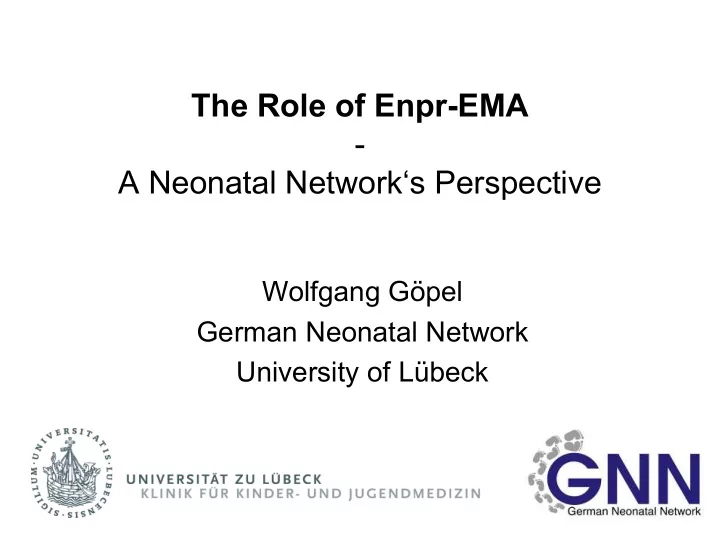

The Role of Enpr-EMA - A Neonatal Network‘s Perspective Wolfgang Göpel German Neonatal Network University of Lübeck
Expectations for Enpr-EMA – A Neonatal Network‘s perspective Who we are • 40 Neonatal Intensive Care Units from Germany. • Funding by the Federal Ministry for Education and Research since 2009. • Last GNN-network meeting in February 2011.
Expectations for Enpr-EMA – A Neonatal Network‘s perspective Aim of our network To improve • the long term outcome • of preterm infants with a birth weight below 1500 grams by • Identification of clinical and genetic risk factors. • Analysis of centre specific treatment strategies. • Supporting clinical trials.
Expectations for Enpr-EMA – A Neonatal Network‘s perspective What we do • Logistics: Transfer and storage of biosamples for more than 40 neonatal intensive care units. • Biobank: Phenotypes and DNA-samples Biobank of more than 7000 very low birth weight infants (5000 mother/infant pairs). Logistics • Genotyping: – Genome wide association studies in preterm infants in 2011. – Single Nucleotide Polymorphism genotyping facility for confirmation studies (>2000 SNPs/day) Genotyping • Clinical data: Regular reports for all participating centres. • Randomised controlled trials: The first GNN-investigator initiated trial was completed in 2010. Another will complete enrolment in 2011/2. Reports RCT
Expectations for Enpr-EMA – A Neonatal Network‘s perspective Problems with clinical trials Problems of neonatologists 250 with clinical trials: • Is there a chance, that the 200 medication studied is really beneficial? 150 • No sufficient infrastructure 100 for clinical trials (e.g. study nurses). 50 • Overwhelming documentation (CV, CRF, 0 SAE…); some within 24 2_08 5_08 8_08 2 09 5 09 8 09 11_07 11_08 hours. Enrolment of patients in the AMV-trial: Green line: planned enrolment Red line: achieved enrolment
Expectations for Enpr-EMA – A Neonatal Network‘s perspective Why are clinical trials in newborns and preterm infants so important? • In a UK study, 90% of all babies on a neonatal intensive care ward received a drug that was either unlicensed or used „off label“ (Arch Dis Child 1999; 80:F142-5). This is a severe problem since newborns are special: • Side effects are underreported. • Drug absorption via the gastrointestinal tract is variable. • Their total body water is much higher than in adults. • Many enzymes involved in drug metabolism have a reduced activity in newborns. • Renal function – which is crucial for the excretion of many drugs – depends on gestational and postnatal age. • Drug interactions might be excessive, especially in preterm infants (figure, n=4853).
Expectations for Enpr-EMA – A Neonatal Network‘s perspective Expectations I: Trials NEOOPIOD SW Fentanyl, 2008 • Support clinical studies on Morphine drugs which are already in use – although not licensed TINN FR Fluconazole 2008 (FP7-trials see table). Ciprofloxacin • Support licensing and clinical NEMO UK Bumetanide 2009 studies for new medications which might be beneficial for THE HIP IR Dopamine, 2010 newborns (e.g.: analgesics TRIAL Adrenaline with less side-effects, new antibiotics) NEUROSIS D Beclomethasone 2010 • Support interaction between groups studying drugs in NEOMERO I Meropenem 2010 newborns (e.g. face to face meetings of FP7 projects). TINN2 FR Azithromycin 2011 NeoCirc UK Dobutamine 2011
Expectations for Enpr-EMA – A Neonatal Network‘s perspective Expectations II: Monitoring and Documentation KISS: Keep It Simple and Smart • Simple methods for collecting, storage and analysis of biosamples. • Simple methods for documentation of exposures, endpoints and severe adverse events (SAEs). • Smart methods for drug monitoring and pharmacokinetics. • Limit/reduce bureaucracy (especially for investigator sponsored trials).
Expectations for Enpr-EMA – A Neonatal Network‘s perspective Expectations III: Challenges of the future • We need data from very large cohorts of preterm infants. • Translational medicine in Neonatology: – Transfer of study data into clinical practice. – Transfer of best-centre data into treatment protocols • Personalised medicine will be much more relevant than nowadays, especially for drug prescription in neonates and preterm infants: Individual dosing including • Analysis of monitoring data • Pharmacogenetics • Drug interactions • Mikrobiom analysis
Expectations for Enpr-EMA – A Neonatal Network‘s perspective Personal Conclusions • It is very important to communicate, that research is helpful to improve neonatal care. • In the forthcoming years, the German Neonatal Network will focus its efforts on translational and personalised medicine. – Translational Medicine • Transfer of new RCT-data. • Development of suitable protocols. – Personalised Medicine • Analysis of large cohorts. • Reduce costs of sampling and biobanking. • Reduce costs of phenotyping. • The GNN is keen to learn from other paediatric networks and to share its expertise with Enpr-EMA. • Finally, neonates and their parents should benefit from all our efforts.
Recommend
More recommend